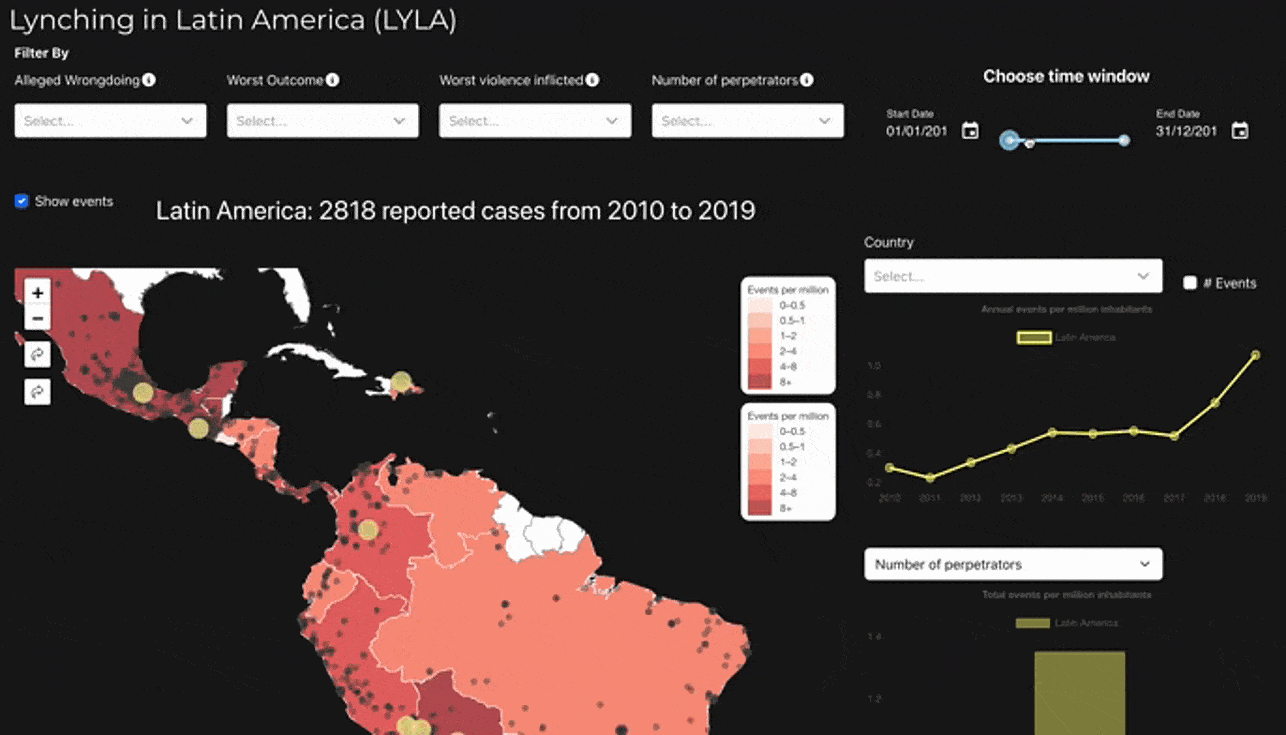Lynching in Latin America (LYLA)
Lea esta página en español aquí.
The Lynching in Latin America (LYLA) dataset is the first cross-national lynching event dataset. The LYLA data captures 2818 reported lynching events across 18 Latin American countries from 2010 to 2019.
You can explore the data using our externe Seite interactive tool (external link).
What does lynching mean?
We understand lynching as publicly displayed physical violence executed by a group of civilians against alleged wrongdoers.
For a lynching to occur we therefore require that the following four criteria are met.
1. An act of physical violence.
2. The act is perpetrated by a group of civilians.
3. The perpetrators must act against some alleged wrongdoing.
4. The act must include some form of public display.
What is the geographical coverage of the LYLA data?
Spanish and Portuguese speaking countries in Latin America.
Specifically: Argentina, Bolivia, Brazil, Chile, Colombia, Costa Rica, Dominican Republic, Ecuador, El Salvador, Guatemala, Honduras, Mexico, Nicaragua, Panama, Paraguay, Peru, Uruguay, and Venezuela.
How was the LYLA data collected?
To identify and categorize lynching events, we relied on human coders reviewing local and national news sources across Latin America.
What is included in the LYLA data?
Identified lynching cases are coded to capture key details, including:
- date of the event
- geo-coded location
- number of targets and perpetrators
- the form of violence
- the alleged form of wrongdoing
- and the physical consequences suffered by the targeted person
How to use the LYLA data?
The data can be used to identify broad trends in reported lynchings across Latin America and within each country.
All events in the LYLA data are geo-coded, and compatible with other socio-economic spatial data, facilitating research on the causes and consequences of lynching.
Users should be aware that the LYLA data captures reported lynchings. As for any other type of violence, there is a significant number of lynchings that go unreported in the media.
How to cite the LYLA data?
Nussio, Enzo, and Govinda Clayton (2024). “Introducing the Lynching in Latin America (LYLA) Dataset.” Journal of Peace Research.
Download the data introduction paper Download here (PDF, 1.4 MB).
Downloads
Original dataset: Download excel (XLSX, 8.6 MB) or Download stata (DTA, 8.1 MB) file
Download Codebook (PDF, 157 KB): The codebook includes the names and descriptions of all variables contained in the LYLA dataset.
Download Data introduction paper (PDF, 1.4 MB): This paper discusses the concept of lynching, describes coding procedures, and introduces the dataset.
Download Online Appendix to the data introduction paper (PDF, 552 KB)
Visualizations
Static figures for download:
- Download Map of lynchings across Latin America (JPEG, 228 KB)
- Download Timeline of lynchings across Latin American countries (PNG, 507 KB)
- Download Map of lynchings across Mexico (JPEG, 229 KB)
- Download Map of lynchings across Mexico City (JPEG, 534 KB)
Supporting materials
Download Individual country reports (PDF, 1.9 MB): These reports for each country include a comparison of the LYLA data with other available country-level data and additional recommended studies.
Journalistic reporting based on the LYLA data:
- Revista Nexos: externe Seite Sed de Justicia
Related publications:
Dataset creators and collaborators
Creators: Enzo Nussio and Govinda Clayton
Research assistants (in order of joining the project): Alina Gäumann, Ana Maria Burgos, Clélia Savary, Sophia Johanna Schlosser, Reetta Välimäki, Stefanie Matter, María Murias Muñoz, Victor Muñoz Varela, Zoé Goy, Onerva Martikainen, Marco Grünenfelder, Maurus Dora, Victoria Haerter, Norman Kneubuehler, Nicolas Schmidheiny, Liliana Martínez, Fernando González Adauto, María Cristina Gúzman Solís
Funding
The LYLA data collection was made possible by generous funding from the externe Seite Swiss National Science Foundation (project number: 184957) and from the Center for Security Studies (CSS) at ETH Zurich.
Queries
For any queries relating to the dataset, please contact Enzo Nussio.
